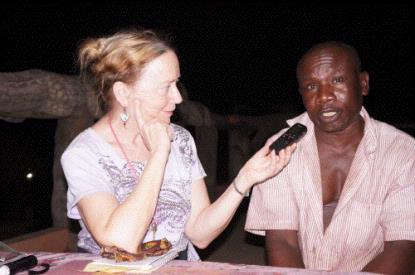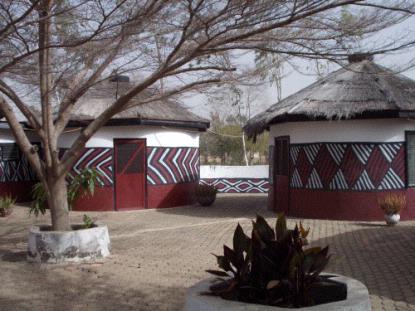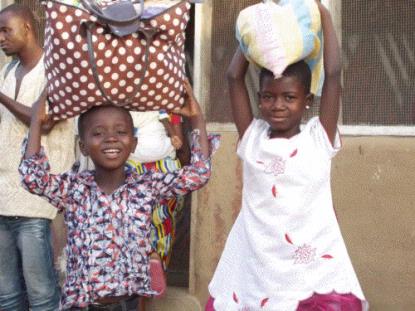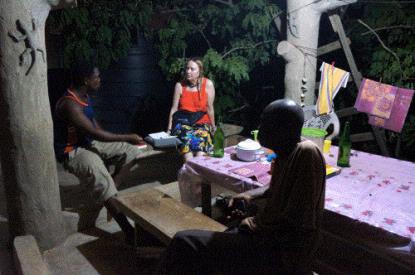
In January this year I went to Ghana in West Africa for three weeks. I am a professional storyteller and I perform many kinds of stories including folktales and historical stories for children and adults. Sometimes the desire to collect folktales instead of just reading them in books leads to an urge to travel. This is what brought me to Ghana.
And so the story starts: we were on a rooftop in Nungua, a suburb of Accra, at a place called Aba House, a  cultural compound for visiting and native artists and educators. One visiting sculptor had carved giant crocodiles all around the periphery of the roof. The night was hot and humid and the light was from the moon and the stars and one hanging lantern. The ocean waves provided part of the soundtrack.
cultural compound for visiting and native artists and educators. One visiting sculptor had carved giant crocodiles all around the periphery of the roof. The night was hot and humid and the light was from the moon and the stars and one hanging lantern. The ocean waves provided part of the soundtrack.
The cook at Aba House, Talk True, had arranged for three nights of storytelling. He invited two friends from the Ewe tribe “And then,” he said, “I will tell on the last night. I will be the ‘last killer.’”
When storyteller Big Joe told his tales in the original Ewe, Talk True translated, but the sounds of the Ewe language were so much more musical and intriguing than the English. Two Africans and three Americans, all drinking Talk True’s delicious, cold hibiscus drink (made with a dash of hot pepper), formed an appreciative storytelling audience and we all laughed and laughed at the punch lines. The translation was certainly conveying the story’s main message.
“Pig and Tortoise went into business together thinking they could make money. They did well until Tortoise and his new wife got greedy and started skimming the money off the top of every deal. When Pig realized that he was being cheated, he came to Tortoise for his money. Tortoise put Pig off for weeks with all kinds of tricks.
“One day Tortoise had a new idea. He folded his legs and hid inside his shell. He told his wife, ‘This is your new granite stone so you can grind pepper on it.’ Then Pig came and said, ‘Where is your husband? Where is your husband? If you don’t answer me I will take your stone and throw it into the bush.’ The woman didn’t answer, so Pig grabbed the stone and threw it away. A few minutes later Tortoise appeared and heard his wife and Pig arguing.
“‘Oh, Pig, there is no need for arguing. Your money is ready. Just go and get that stone wherever you threw it. Your money is safely hidden inside.’
“To this day Pig is still looking for that granite stone. After searching for days, he decided it must have sunk into the earth. So if you see Pig digging and digging in the ground, now you know why.”
By the end of my third night at Aba House, I had heard fourteen stories. Cephus Mensah Amabale told a story about a beautiful woman from a wealthy family with more suitors than she could count. Her family constructed a series of tests to determine which man really loved her for herself rather than for her money or her looks. Ben Kwao Adipah told a story about a chief’s wife who is unable to give him a boy child so he keeps marrying more and more wives, all of whom have girls.
But it was time to leave Nungua and travel along the coast to Kopeyia, another cultural compound specializing in drumming. On the way we stopped at Keta for lunch outdoors on the beach: fried tilapia caught that morning and fou fou (pounded cassava) with “red red,” a spicy sauce made with vegetables and red peppers. I pictured Tortoise’s wife pounding those red peppers on her granite stone.
 At every beach we passed in our un-air conditioned van, we watched fishermen in brightly painted wooden fishing boats bobbing on the waves and women sorting many different kinds of fish in wooden baskets. We went to market day in Denu and everything was for sale from shoes to auto parts to towering piles of mangoes. We saw what amounted to a “fish aisle” with twenty or thirty women selling every kind of fresh and dried fish from their baskets. It had the feel of an auction as men yelled out types of fish and their prices, but not in English!
At every beach we passed in our un-air conditioned van, we watched fishermen in brightly painted wooden fishing boats bobbing on the waves and women sorting many different kinds of fish in wooden baskets. We went to market day in Denu and everything was for sale from shoes to auto parts to towering piles of mangoes. We saw what amounted to a “fish aisle” with twenty or thirty women selling every kind of fresh and dried fish from their baskets. It had the feel of an auction as men yelled out types of fish and their prices, but not in English!
In Ghana most people speak English but when they speak to each other they use their native language. And also, although most people are Christian or Muslim, many of them practice a much older, animist African religion as well. In the small villages, the native culture–fetish priests, traditional health cures, drumming, dancing, singing, storytelling, and pottery making–is still very much intact.
Happily for tourists, friendliness in Ghana is abundant. In Kopeyia, Kofi Agbeli, our guide at the “Dagbe” compound, organized an evening of storytelling just for us. He told three stories and then I told one. Everyone sang and danced and drummed, for his stories, and for mine as well.
compound, organized an evening of storytelling just for us. He told three stories and then I told one. Everyone sang and danced and drummed, for his stories, and for mine as well.
After we left Dagbe, Kofi called the next day to make sure that our travels were going well. At the time we were visiting two “Kente cloth villages” and buying some of the famous (and gorgeous) fabric. We told Kofi that everything was great, little knowing that we would arrive later that day (a Friday afternoon) in the city of Kumasi to find that every hotel was booked. We were hot and tired and getting a little desperate when the third hotel said “no.”
I used my storytelling skills to describe how much we needed a room and this brought quick results. Within ten minutes the hotel clerk introduced us to a former employee who hopped in our van and led us to “The Pink Panther Hotel.” There we were shown to the “Executive Suite.” It had two huge rooms, red velvet couches, an exercise bicycle, a stereo, a microwave, and best of all, air conditioning and two beds.
(End of Part 1)
Next, a fascinating women’s artist cooperative: painted houses, pottery, and more stories.
Top and bottom photos by Ann Schunior; others by Sharon Kennedy
To learn more about Sharon Kennedy’s body of work, visit her web site at
http://sharonkennedy.com.

